Queens of the Stone Age
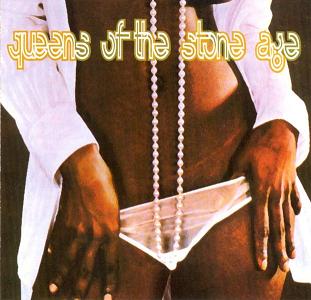 (1998)
(1998)
I am 17 and reading Spin magazine on blue, hard-on-the-elbows carpet in my bedroom in Baldwinsville, NY. There is a proto-listicle about the stoner-rock renaissance. Queens of the Stone Age catch my eye: the ironic/reactionary name, the pin-up-style first album cover, and the concept of an entire desert-rock experimental subculture happening somewhere out West. Remote artistic subcultures are very appealing to sensitive 17-year-old boys who live in Baldwinsville. It is also important to note here that I have just heard We Sold Our Soul for Rock ‘n’ Roll for the first time at a recent sleepover, and low-tuned guitars are now a thing I care about.
The songs are just grooves, melody, and crunch. Grooves played over and over, for effect, and because that’s what the songs are about: beating something into your brain. Or so I think. “You Can’t Quit Me Baby” is just killer. I only get to hear a few songs from this album at that time, while plugged into a listening station at a record store.
Rated R
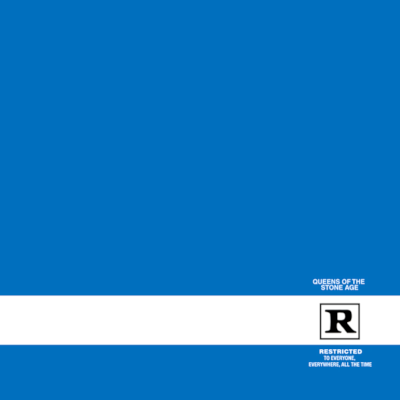 (2000)
(2000)
Rated R arrives the summer between my freshman and sophomore years at college. I am 19 and I have just broken up with my girlfriend before classes let out, and I am living once more with my parents. I am on a very flaky dial-up connection at my camp in the Adirondacks, fighting for phone line time, and Napster is still a thing you can use to download music.
I leave my computer on for long, long hours overnight, waking up to find maybe two or three full songs downloaded. It might never have occurred to me that I could have mail-ordered a CD in as much time. Still, I am mostly broke, living off whatever “landscaping” money I do not convert into Old Milwaukee and French fries.
I love the minimal album cover. The tension in the songs between “We are ironically singing about drugs and alcohol” and “This was probably written under the influence of drugs and alcohol” is palpable. Screaming Trees singer Mark Lanegan appears on a track or two. I saw the Screaming Trees at Lollapalooza in Syracuse during high school. It sounds like he’s found some smart dudes with good chops to carry his work. If you want to hear how far the band has progressed from the first album, crank up “Better Living Through Chemistry.”
Sophomore year arrives. I force Rated R and the self-titled debut album on everyone. I find success with a few people on my dorm hall. “Feel Good Hit of the Summer” is the foot in the door. My roommate and certain friends launch a small intervention; they are sick, just absolutely exhausted, of hearing “If Only” numerous times every day. I can’t help it, really. I am a “media studies” major who stays in his dorm room a lot, and I have no idea what I am doing.
Songs for the Deaf
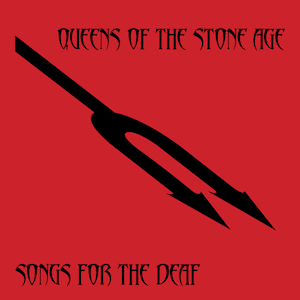 (2002)
(2002)
It is almost the end of a strangely carefree bachelor summer, but the glorious news leaked out long before: Dave Grohl, drummer for Nirvana (freaking Nirvana), is playing drums. This is great news and this is terrible news. I steel myself for the bandwagon stampede. People my age, 21, and the slightly younger people I find much more annoying, are going to be all over this. Like they were about Nirvana after Kurt Cobain’s death, even though they obviously didn’t know him like I did. And they do end up totally all over this, as are most people who hear the songs.
“No One Knows” doesn’t come out for a few months after the album. By then, I have already transferred a copy of the album onto MiniDisc for my friend Josh, and I have come to the conclusion that, at age 20, this might be a good point to stop keeping up on New Music, because this feels like a high tide mark. I have long tried to make such lame inner monologue pronouncements.
But can you tell me which (non-hip-hop) album is as much fun as Songs for the Deaf that year, those few years? Can you point to any other record of the last decade or two that can even attempt to wield the broadsword that Sabbath, Led Zeppelin II, Sticky Fingers, and/or Cheap Trick brought into hi-fi battle? No, you cannot.
Even the gimmick-y interstitial tracks work, because the album’s “concept” is that modern radio really sucks. Everyone knows this, but this band tried to do something about it, in its way. Man, this album.
Lullabies to Paralyze
(2005)
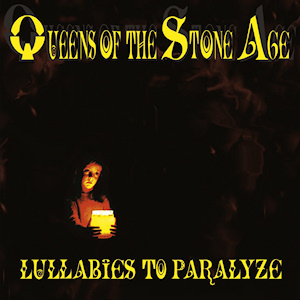
This one is not about who is joining Queens, but who is gone: Nick Oliveri, the seriously goatee-d bassist who did something that frontman Josh Homme was not happy with. Oliveri contributed energy and some winningly scream-y vocals on the previous albums, and seemed to drive forward the reckless hedonism.
I am 24 and working at the Niagara Gazette, and in a pretty bad mood about everything except drinks after work, and I listen to this album on a desktop computer I assembled and configured myself, running Linux for the first time. I live in an apartment in Buffalo’s Allentown neighborhood that has dozens, dozens, dozens of house centipedes.
It sounds different. Gothic, down-tuned, often down-tempo. “Little Sister” is a killer hook, but sounds orphaned on the track list. It’s a hard album to grow to like.
Era Vulgaris
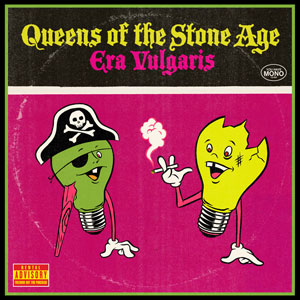 (2007)
(2007)
The first Queens album I buy as a combination CD/MP3 download is something of a return to form, but weird, strange, off. The lead track “3’s & 7’s” is stuffed with riffs, but they’re not quite… flavorful? What have I gotten myself into here, writing about music?
I listen to it a few times that summer of my 26th year, on the Boston Acoustic speakers attached to my laptop in the lower section of the half-house apartment I share with my newly wed wife. It gets tucked into some desk pile until it comes time to apply to write for Lifehacker. That requires some semblance of a personal portfolio website, which requires learning how to install WordPress and having a few posts up. That requires a weekend with some very late nights, and Era Vulgaris spins many more times.
If this was their swan song, it would be a acceptable if modest exit, with some off-key notes and familiar harmonies. It’s not bad, and if it was any other band with their first album, it might garner some small accolades.
It will be six years before another QOTSA album arrives. I had no idea it was coming.
… Like Clockwork
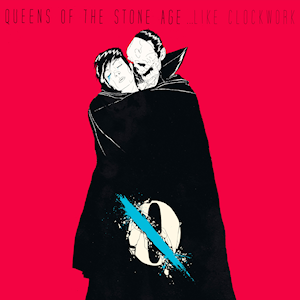 (2013)
(2013)
I am dressed in running gear, hunched over my phone in my living room, waiting for this album to download from the Amazon MP3 store. I have seen great reviews, heard good things. One gray and lightly fogged morning, I fit my mildly uncomfortable Bluetooth headphones over my huge ears, do the 19 other tiny actions I need to get running, and head out the door.
This is the best Queens of the Stone Age album. It is not the most surprising, or hedonistic, or the one that makes me feel like I can escape high school or college loneliness or bad jobs, but it feels the most thought-out and complete. It revisits some of the darkness of Lullabies, it has hooks (“I Sat By the Ocean” that prove its lineage from QOTSA and Rated R, and the heavy bottom of Songs for the Deaf. The cynical humor, the mid-song direction shifts, and nothings sounds quite tossed off, except the stuff that is meant to sound tossed off.
I turn east onto Bryant Street, toward the end of the 6-minute epic “I Appear Missing”. I’m heading back to my dog, my two cats, my wife, and a Chromebook open in the kitchen, on which I will grind through email after a shower. I am 32 years old. I have both my own writing business and co-ownership of a coworking space. I have a meeting later that night for the not-for-profit event I helped start three years back.
This year, in particular, I think back a lot to my 17-year-old self. Would have have liked this album better than the more straight-forward self-titled debut? Did he have any idea he was going to turn out to be the kind of person who has extra-curricular activities, even when he doesn’t need to pump up a college application? How lame does he perceive me to be, exactly? How can any music be the same as you get older?
Music is weird that way.